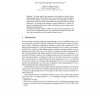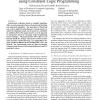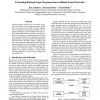529 search results - page 11 / 106 » Simple Random Logic Programs |
126
click to vote
ICLP
2003
Springer
15 years 7 months ago
2003
Springer
We equip ordered logic programs with negation as failure, using a simple generalization of the preferred answer set semantics for ordered programs. This extension supports a conven...
153
click to vote
ILP
2004
Springer
15 years 7 months ago
2004
Springer
One challenge faced by many Inductive Logic Programming (ILP) systems is poor scalability to problems with large search spaces and many examples. Randomized search methods such as ...
157
click to vote
IFIP
2001
Springer
15 years 6 months ago
2001
Springer
— Semi-formal verification based on symbolic simulation offers a good compromise between formal model checking and numerical simulation. The generation of functional test vector...
APIN
2010
15 years 2 months ago
2010
Artificial neural networks can be trained to perform excellently in many application areas. While they can learn from raw data to solve sophisticated recognition and analysis prob...
LICS
2002
IEEE
15 years 7 months ago
2002
IEEE
In joint work with Peter O’Hearn and others, based on early ideas of Burstall, we have developed an extension of Hoare logic that permits reasoning about low-level imperative pr...



